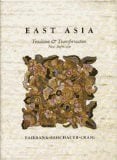Try searching by Title, Author or ISBN
No Results for "{{sharedState.searchQuery}}"
Availability
Featured
Condition
Format
Digital
Age
Grade
Categories
Print Size
Language

East Asia : Tradition and Transformation
Hardcover
East Asia : Tradition and Transformation
